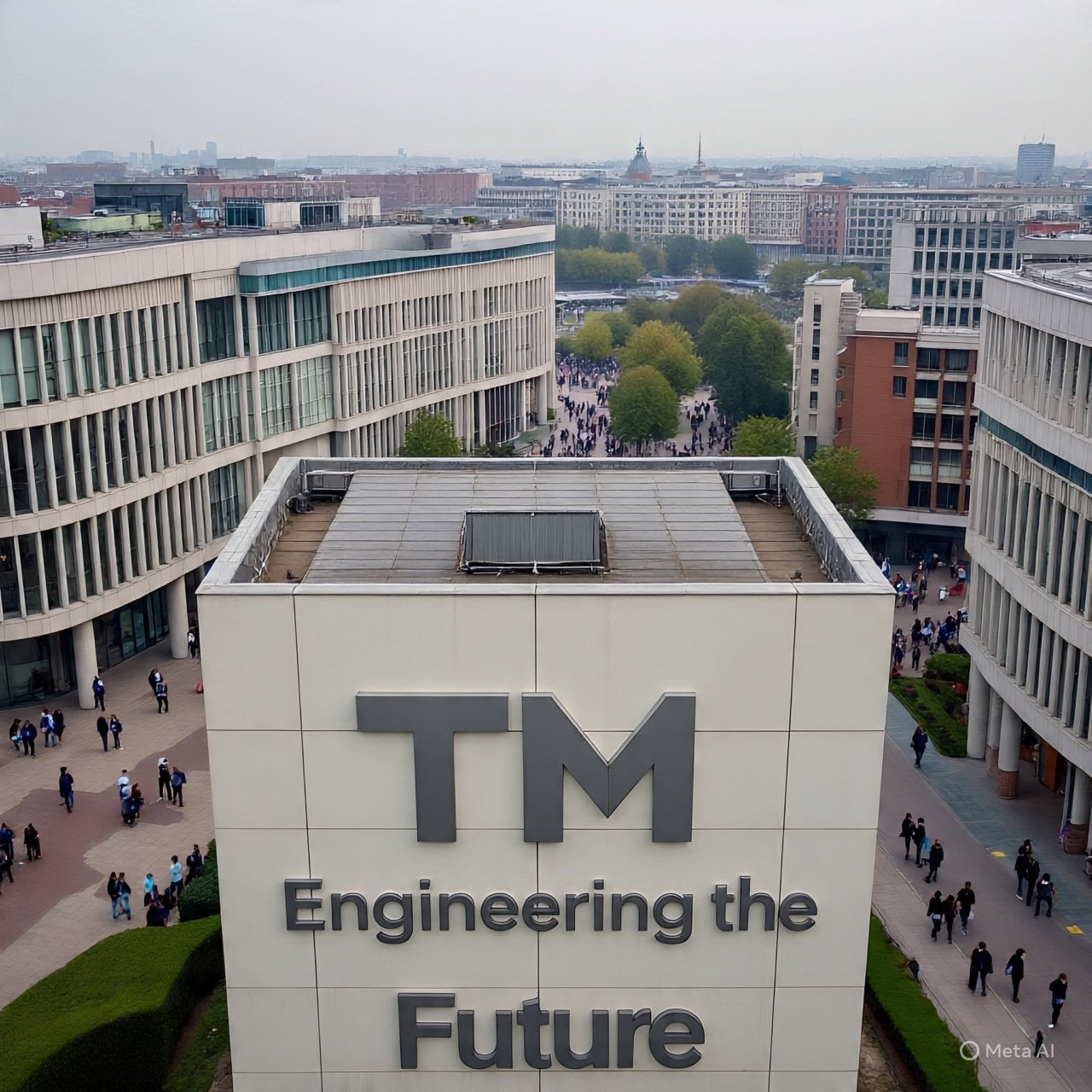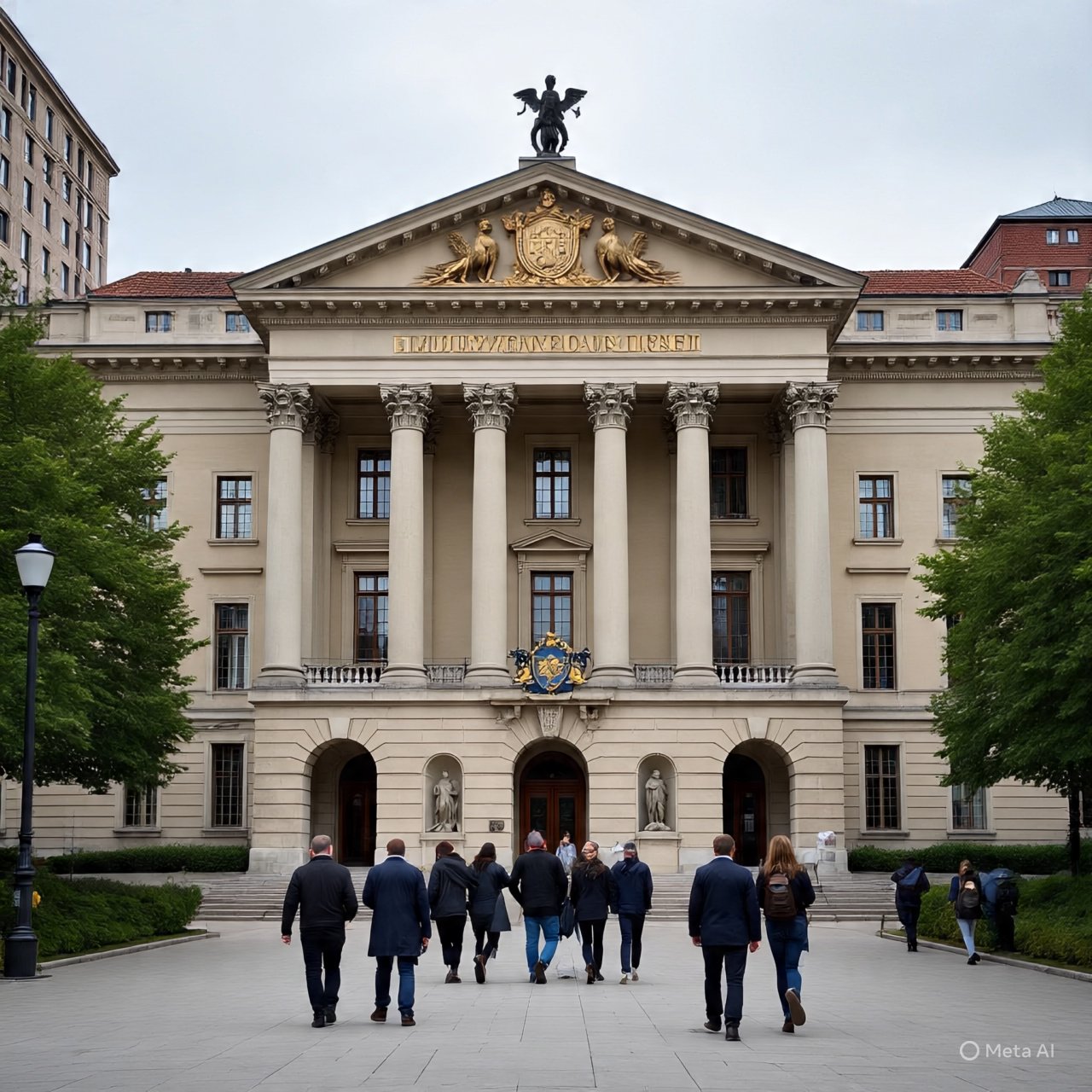🏛️ Introduction: Representative of German Engineering Excellence
Technical University of Munich (TUM) is a shining chapter in Germany’s educational history. Established in 1868, this university has today become a symbol of leadership not only in Europe but throughout the world in the field of engineering and technology.
Introduction: Representative of German Engineering Excellence
Technical University of Munich (TUM) is a shining chapter in Germany’s educational history. Established in 1868, this university has today become a symbol of leadership not only in Europe but throughout the world in the field of engineering and technology. This historic educational institution in Munich has set new standards in every field of engineering throughout its more than one and a half centuries of history and has played an important role in shaping the future. The secret of TUM’s greatness lies in its unique educational model that establishes the best balance between the traditional German education system and modern global requirements. This university not only provides higher education to its students but also develops critical thinking, creative ability, and a sense of social responsibility in them. Research conducted in TUM’s engineering fields has opened new paths for industrial development, economic prosperity, and social welfare. The biggest reason for this university’s success is its deep connection with industry, where every aspect of education and research is focused on solving practical life problems. TUM’s graduated students hold important positions in renowned industrial institutions, research centers, and educational institutions worldwide and are playing a significant role in society’s development through their expertise and leadership. This university not only teaches engineering but also provides future engineers with the mindset and skills they need to succeed in a complex and rapidly changing world. This article will present a comprehensive review of TUM’s establishment, its historical evolution, educational structure, research achievements, industrial partnerships, international cooperation, and future vision.
Historical Evolution: The Journey from 1868 to Present
The history of Technical University of Munich began in the mid-19th century when King Ludwig II decided to establish a new technical university in Bavaria. Established in 1868 as “Royal Bavarian Polytechnic Munich,” this university’s purpose was to train experts to meet the demands of the Industrial Revolution. In the initial period, the university provided education in civil engineering, mechanical engineering, and chemical engineering fields. At the beginning of the 20th century, the university introduced new fields of electrical engineering and aeronautical engineering. In the 1930s, the university’s name was changed to “Technical University of Munich.” After World War II, the university developed rapidly and in the 1960s, it also started providing education in the medicine field. In the 1970s, the university established new campuses in Garching and Weihenstephan. In the 2000s, TUM was declared Germany’s “University of Excellence.” In 2017, the university introduced new engineering fields including robotics, artificial intelligence, and biomedical engineering. Today TUM is known as Germany’s most prestigious technical university with a strong network globally and which is continuously establishing new trends in engineering and technology fields. The university’s historical development journey reflects its strong leadership, clear vision, and uncompromising commitment to quality.
Academic Structure: Expertise in Every Field of Engineering
Technical University of Munich’s academic structure provides complete expertise in every field of engineering. The university has 13 departments which include mechanical engineering, electrical engineering, civil engineering, chemical engineering, computer science, medicine, physics, chemistry, mathematics, social sciences, education, economics, and architecture. Each department provides world-class education and research in its field. The characteristic of the university’s engineering programs is their practical and research-oriented approach. Students have access to state-of-the-art laboratories, workshops, and research facilities. The university’s “TUM Learning Factory” provides students with the opportunity to work in an industrial environment where they work on solving real industrial problems. Interdisciplinary programs have given students the opportunity to be equipped with knowledge from different fields, which develops broad-mindedness in them and enables them to view complex problems from different angles. The university’s teaching success can be gauged from the fact that its graduated students hold important positions in renowned industrial institutions, research centers, and educational institutions worldwide. Another characteristic of TUM’s academic programs is their flexibility, under which students can choose their educational paths according to their interests and career goals.
Research Excellence: Inventions and Discoveries
Technical University of Munich’s research excellence makes it one of the world’s best technical universities. The university’s researchers have made revolutionary discoveries in every field of engineering. In mechanical engineering field, university researchers have developed state-of-the-art engine designs, robotic systems, and manufacturing technologies that are causing new revolutionary changes in industry. Research in electrical engineering field on semiconductor technology, power systems, and communication networks has played an important role in industrial development. Research in computer science field on artificial intelligence, data science, and cybersecurity has opened new doors of technology. University researchers have won 15 Nobel Prizes, 23 Leibniz Prizes, and 30 ERC Grants. The secret of the university’s research successes lies in its strong infrastructure, immense resources, and international cooperation. An important aspect of TUM’s research is its interdisciplinary approach, where experts from different fields work together and discover comprehensive solutions to complex problems. The focus of the university’s research is not only basic research but a large part of it is also focused on applied research that proves helpful in directly solving industry and society’s problems.
Industrial Partnerships: From Knowledge to Industry
Technical University of Munich’s industrial partnerships are an important component of its research achievements. The university has established partnerships with major companies in automotive, aviation, energy, telecom, and manufacturing sectors. These include global companies like BMW, Siemens, Airbus, Bosch, Infineon, and MAN. These industrial partnerships work on three main axes: joint research projects, industrial chairs, and incubation centers. The university’s “TUM Entrepreneurship Center” has supported 500+ startups, many of which are now successfully operating globally. An important aspect of industrial cooperation is the “dual diploma” program, under which students receive training in industrial organizations during their education and work on real industrial problems. The university’s industrial partnerships have not only provided research resources but have also created employment opportunities for students. TUM’s relationship with industry is not limited to research cooperation only but also includes aspects like curriculum development, faculty training, and joint policy making. This deep industrial connection helps the university ensure that its education and research meet industry’s current and future requirements.
International Cooperation: Global Level Impact
Technical University of Munich has established its identity internationally very rapidly. The university has cooperation agreements with 500+ international universities, including world-renowned universities. Regarding international students, TUM’s policy is extremely comprehensive – currently, 10,000 international students from 120+ countries are studying at the university, which is approximately 25% of total students. The university’s international research cooperation includes European Union research programs, global research networks, and international research projects. The university has established TUM Asia campus in Singapore which strengthens its presence in Asia and provides Asian students with German standard education. TUM’s position in international rankings is enviable – in QS World University Ranking 2023, it was ranked the 50th best university in the world. The secret of the university’s international success lies in its diverse cultural policy, curriculum according to international standards, and globally recognized degrees. The university has provided special facilities for international students, including German language courses, cultural adaptation programs, and international scholarships.
Innovation Environment: Innovation and Creativity
Technical University of Munich gives special importance to the innovation environment. The university has established “TUM Innovation Network” which acts as a bridge between research and industry. This network includes 15 incubation centers, 10 accelerator programs, and 5 technology parks that help give commercial shape to new business ideas. The center of the university’s innovation policy is “From Lab to Market,” under which students and researchers are helped to give commercial form to their discoveries. The university’s “TUM Venture Labs” supports 100+ new business projects every year and provides them with financial support, mentorship, and networking opportunities. The university has allocated special funds for innovation activities, including “Innovation Grants,” “Proof of Concept Awards,” and “Startup Loans.” The university’s innovation successes can be gauged from the fact that since 2010, institutions associated with the university have filed 2,000+ patents and 300+ new technology companies have been established. The secret of the innovation environment’s success lies in the university’s “Innovation Ecosystem,” in which research institutions, industrial partners, investors, and government agencies work together.
Campus and Infrastructure: State-of-the-Art Facilities
Technical University of Munich’s campuses are built on state-of-the-art construction technology and sustainable design principles. The university has three main campuses: Munich Central Campus, Garching Campus, and Weihenstephan Campus. Munich Central Campus consists of the university’s historic buildings where administrative offices and some academic departments are located. Garching Campus is dedicated to physics, chemistry, mechanical engineering, and electrical engineering fields and is one of Europe’s large research campuses. Weihenstephan Campus is dedicated to agriculture, food science, and environmental science fields. Environmental protection has been given special importance in campus construction – all buildings meet the latest standards of energy saving and environmental protection. The university campuses have state-of-the-art libraries, research laboratories, lecture theaters, student residences, and recreational facilities. Special attention has been given to modern transportation arrangements on campus, including electric buses, cycle sharing systems, and automated parking systems. The university campuses are not only centers of education and research but also serve as centers for academic exchange and cultural activities.
Student Life: A Comprehensive Educational Experience
Student life at Technical University of Munich provides a comprehensive educational experience. More than 40,000 students study at the university, of which 10,000 are international students. The university has provided 10,000+ residential units for students, equipped with state-of-the-art facilities. The university’s “Student Life Center” has 150+ student organizations working, including cultural clubs, academic societies, and sports teams. The university’s “Sports Complex” is of Olympic standard, including swimming pool, gym, and sports fields. For student health and well-being, the university has established a “Student Wellness Center,” where medical facilities, psychological counseling, and nutritional advice are provided. For students, the university has established a “Career Development Center,” which helps them find employment opportunities. The university’s “Cultural Programming” includes music concerts, theater performances, art exhibitions, and academic lectures. The university has also established numerous scholarships and financial aid programs for students. To promote student participation, the university has established a “Student Governance System,” under which students can participate in the university’s decision-making process.
Research Infrastructure: State-of-the-Art Equipment
Technical University of Munich’s research infrastructure is counted among the world’s best research centers. The university has 500+ research laboratories, where 8,000+ researchers work. The university’s “Research Reactor” is used for neutron research and is important for research in physics and materials science fields. The university’s “Data Center” is included in Europe’s large data centers, with storage capacity of 200 petabytes and is used for artificial intelligence and data science research projects. Research in nanotechnology and microelectronics fields happens in the university’s “Clean Rooms,” where nanomaterials and microchips are manufactured in extremely clean environments. The university’s “Energy Research Center” is dedicated to research on renewable energy, where research is happening on solar energy, wind energy, and hydrogen fuel cells. State-of-the-art AI research is happening in the university’s “Artificial Intelligence Lab,” which includes machine learning, deep learning, and natural language processing fields. For maintenance of research infrastructure, the university has deployed 1,000+ technical staff. The university’s research equipment and facilities are also available to international researchers, which has promoted international research cooperation.
Sustainability Initiatives: Environmental Responsibility
Technical University of Munich has made several notable initiatives in sustainability sector. The university has set the target of becoming carbon neutral by 2030 and is working on renewable energy projects in this regard. Solar panels of 25,000 square meters have been installed on the university campus, which meet 35% of the university’s energy needs. Under the university’s “Sustainable Mobility Plan,” 60 electric buses are running on campus, while parking facilities for 3,000 bicycles have been provided. Under the university’s “Waste Management System,” 85% of waste is recycled. Under the university’s “Water Conservation Program,” rainwater is collected and used. The university has worked on the “Green Roofs” project, under which gardens have been planted on the roofs of 15 buildings. Under the university’s “Biodiversity Protection Program,” 600 local plant species have been preserved on campus. The university has implemented a “Sustainable Food Policy,” under which local and organic food is preferred on campus. The university’s sustainability initiatives have been recognized internationally and it was awarded the “Green University Award” in 2023.
Social Impact: Integration with Local Community
Technical University of Munich has deep connections with the local community. The university has established a “Community Engagement Program,” under which scientific education is provided to local school students. In the university’s “Public Lecture Series,” free lectures for the general public are arranged every week, where university faculty inform the public about their research. The university’s “Science Museum” introduces 60,000+ visitors to science and technology every year. The university has established a “Local Business Support Program,” under which technology and mentorship are provided to local businesses. Under the university’s “Healthcare Initiative,” free medical examination facilities are provided to the local population. The university has established “Cultural Exchange Programs,” under which joint programs are arranged with local cultural institutions. Projects for solving local problems are being worked on in the university’s “Social Innovation Lab.” The university’s “Employment Center” has created 8,000+ employment opportunities for local people. The university’s social impacts can be gauged from the fact that it contributes 3 billion euros annually to the region’s economic development. The university’s social services have been given “Public Service Mission” status by the German government.
Future Plans: A Visionary Guidance
Technical University of Munich’s future plans are highly visionary. The university has prepared a “Strategic Vision Plan” for 2030, which has three main axes: research excellence, international cooperation, and social impact. Under the research axis, the university has set the target of establishing 15 new research laboratories in artificial intelligence, quantum computing, and renewable energy fields. Under the international cooperation axis, the university has set the target of establishing 150 new international partnerships. Under the social impact axis, the university has set the target of contributing 5 billion euros annually to the local economy. Under the university’s “Campus Expansion Plan,” 25 new buildings will be constructed by 2028. The university has started a “Digital Transformation Initiative,” under which all educational and research activities will be digitized. Under the university’s “Talent Attraction Program,” the target is to bring 600 top researchers from around the world to the university. There is a plan for 7 billion euros investment for the university’s future success, which will consist of government funds, industrial partnerships, and international grants.
Global Rankings: Success Standards
Technical University of Munich has achieved extraordinary successes in global rankings. In QS World University Ranking 2023, it was ranked the 50th best university in the world, which is the highest rank in the history of any German technical university. Its number in Times Higher Education World University Ranking is 38, while in Shanghai Ranking it is at 52nd position. TUM’s strong points in these rankings include research quality, international cooperation, and industrial impact. In employer reputation standard in QS Ranking, it is ranked 30th in the world. The university has set targets for further improvement in rankings for the future – to be included in top 30 in QS Ranking and top 25 in Times Higher Education Ranking by 2030. To achieve these targets, the university has developed strategies to improve research quality, increase the number of international students, and expand industrial partnerships. For improvement in rankings, the university has established a “Global Ranking Improvement Task Force,” which is working to improve the university’s performance according to ranking standards.
Conclusion: The Journey of Building the Future Continues
The story of Technical University of Munich is the tale of greatness in the field of engineering and technology. The main reasons for its success include historical tradition, research excellence, industrial partnerships, and international cooperation. The university has proven that when educational institutions focus on research and innovation, they can achieve extraordinary successes. TUM’s model is an example not only for Germany but for the entire world, from which other educational institutions can benefit. The university’s future plans are highly hopeful and indicate that it will further strengthen its global leadership in the engineering field. The story of Technical University of Munich is not just the story of a university but the story of a commitment to building the future, whose purpose is not only to teach engineering but to play an important role in building a better and sustainable future. This university is moving towards becoming a center of knowledge and wisdom for coming generations, and its journey towards a bright future continues.


